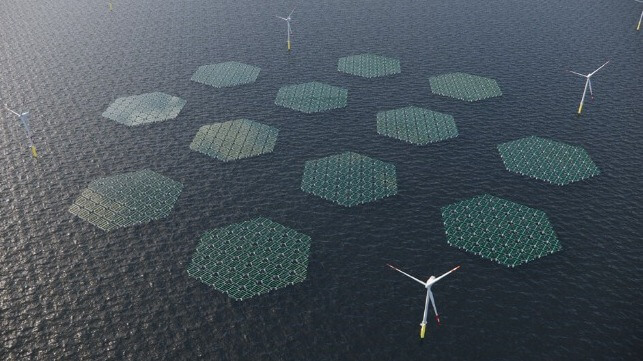RWE Looks to Incorporate Floating Solar into Offshore Wind Farms

In a unique concept, German energy giant RWE is exploring integrating floating solar technology into offshore wind farms to create more efficient use of ocean space for energy generation and an approach that could provide locations with lower wind speeds with a means to develop renewable energy. Collaborating with the Dutch-Norwegian start-up solar energy company SolarDuck, they plan to launch an offshore pilot in the North Sea while also proposing the concept for a new offshore wind farm in the Netherlands.
According to the companies, offshore floating solar technology can establish a new frontier for solar energy and provides an answer to increasing land scarcity for the generation of renewable energy. Their concept is to co-locate the solar panels interspaced between the wind turbines creating an efficient use of use of ocean space for energy generation. The two forms of energy generation will also benefit from the shared construction and maintenance efforts resulting in a more balanced production profile from the location.
“RWE is constantly looking for innovative ways to further improve the production of renewable energy offshore,” said Sven Utermöhlen, CEO of Wind Offshore of RWE Renewables. "With the SolarDuck pilot we are gaining experience with a highly innovative offshore floating solar technology. We are very keen to further explore the potential of offshore floating solar together with our partner SolarDuck.”
While floating solar has been used successfully in near-shore and inland installations, taking solar farms offshore requires a technology that is able to withstand rough offshore conditions, including high waves, strong winds, and a corrosive environment. SolarDuck has developed a triangular-shaped platform, which has received the world´s first certification for offshore floating solar by Bureau Veritas. It is designed to float several meters above the water, following the waves like a carpet. Critical electrical components remain dry, clean, and stable.
To accelerate the development of the technology, RWE will invest in SolarDuck’s full-scale offshore pilot called Merganser, which will have a capacity of 0.5 MWp. The pilot project is expected to be installed off the coast of Ostend in the Belgian North Sea and will be SolarDuck’s first offshore pilot following the successful deployment of an inland pilot in the Netherlands last year.
RWE is also incorporating SolarDuck into its bid for the Dutch tender for Hollandse Kust West (site VII) in the Netherlands. The tender is ongoing for the proposed additional areas of the wind farm which would be located more than 30 miles off the Dutch coast. RWE and SolarDuck are proposing the integration of an offshore floating solar plant at a pre-commercial scale with 5 MWp combined with innovative energy storage solutions into the offshore wind farm.

that matters most
Get the latest maritime news delivered to your inbox daily.
“Showcasing SolarDuck’s robust technology in rough North Sea conditions will enable us to deploy the technology practically anywhere in the world,” said Koen Burgers, CEO of SolarDuck.
In addition to the first two pilot projects, RWE and SolarDuck will explore new opportunities with the objective to develop commercial offshore floating solar parks, both stand-alone and hybrid.
